 Petzlover
Petzlover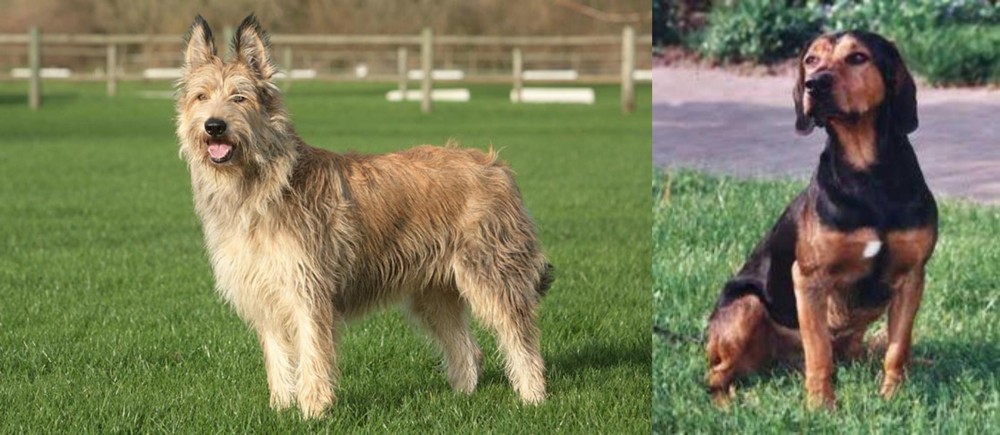 Berger Picard is originated from France but Tyrolean Hound is originated from Austria. Berger Picard may grow 15 cm / 6 inches higher than Tyrolean Hound. Both Berger Picard and Tyrolean Hound are having almost same weight. Both Berger Picard and Tyrolean Hound has same life span. Both Berger Picard and Tyrolean Hound has almost same litter size. Both Berger Picard and Tyrolean Hound requires Low Maintenance.
Berger Picard is originated from France but Tyrolean Hound is originated from Austria. Berger Picard may grow 15 cm / 6 inches higher than Tyrolean Hound. Both Berger Picard and Tyrolean Hound are having almost same weight. Both Berger Picard and Tyrolean Hound has same life span. Both Berger Picard and Tyrolean Hound has almost same litter size. Both Berger Picard and Tyrolean Hound requires Low Maintenance.
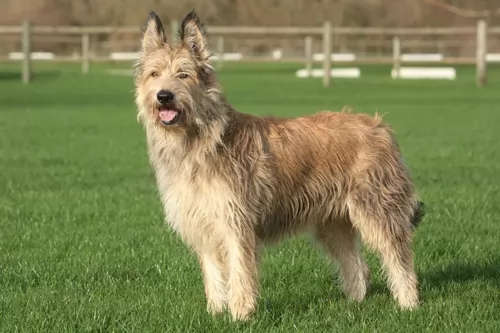 In the Picardie region of northeastern France saw visiting Celts/Franks enter the region along with a shepherd dog. They arrived in the Pas de Calais in 800 AD and might be the oldest shepherd dog of France. Named for Pacardy, the Berger Picard is certainly one of the most ancient of today’s French breeds. Some believe this shepherd comes from the lines of Dutch and Belgian Shepherds, while other insist he is related to the Beauceron and Briard.
In the Picardie region of northeastern France saw visiting Celts/Franks enter the region along with a shepherd dog. They arrived in the Pas de Calais in 800 AD and might be the oldest shepherd dog of France. Named for Pacardy, the Berger Picard is certainly one of the most ancient of today’s French breeds. Some believe this shepherd comes from the lines of Dutch and Belgian Shepherds, while other insist he is related to the Beauceron and Briard.
Never popular as a show dog due to its shaggy appearance, even though it was entered in Frances first dog show in 1863, the breed was almost extinct following the second World War. Currently there are a little under 5000 left in the world with most of them, 3000, in France. The Picard is a good herding dog and loved by the shepherds of the Picardy region. The United Kennel Club recognized the rare breed in 1994, but the AKC did not recognize it until 2016.
The Berger Picard is a loyal, people-oriented dog, good with children and families if socialized as a puppy. In 2006 the Berger Picard Club of America was formed as more and more dogs are being imported from France. There was a genetic study done this year that proposes that 7 breeds of shepherd all descended from a European herding dog that was all over Europe before 1859. This dog was the father of the Berger Picard, the German Shepherd, The Bergamaso Shepherd, the Lupino de Gigante, the Cane Paratore, the Cane da pasore della Lessinia e del Lagorai , and the Pastore d”oropa. After recognition, the Picard was shown for the first time at Krufts in March 2016. They followed that with a best of breed win by Gabby, Guess V.D. Benedicks
 The Tyrolean Hound, also known as Tyroker Bracke or Tiroler Bracke originates from Tyrol, Austria. It seems the dog was developed in the late 1800s for hunting.
The Tyrolean Hound, also known as Tyroker Bracke or Tiroler Bracke originates from Tyrol, Austria. It seems the dog was developed in the late 1800s for hunting.
This is a scenthound that is thought to have descended from Celtic Hounds, Foxhounds and Bloodhounds in the late 1800s.
The dog is a member of the FCI’s scent hound group. The dog was recognized as its own breed in 1908, and in 2006 it was recognized by the United Kennel Club.
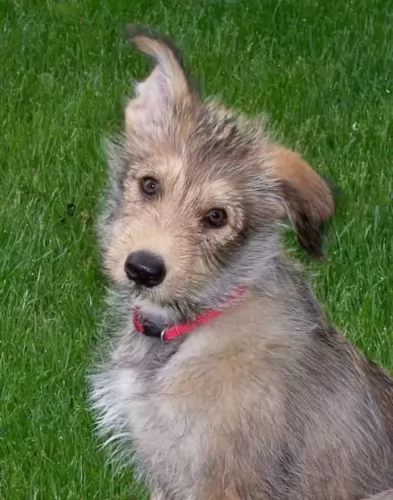 The Berger Picard is a muscular, medium sized, faithful companion. He is especially great with an owner who is athletic and energetic. They have a rugged constitution, slightly longer back, and full tail. The coat is thick, strong and harsh. They are never overweight or bulky. This gives the Berger Picard the look of a mixed breed dog. They have erect ears and thick eyebrows. This lanky looking dog is alert and lively. Movement is efficient, free and tireless. They have strong bones with a sturdy build and a take charge personality.
The Berger Picard is a muscular, medium sized, faithful companion. He is especially great with an owner who is athletic and energetic. They have a rugged constitution, slightly longer back, and full tail. The coat is thick, strong and harsh. They are never overweight or bulky. This gives the Berger Picard the look of a mixed breed dog. They have erect ears and thick eyebrows. This lanky looking dog is alert and lively. Movement is efficient, free and tireless. They have strong bones with a sturdy build and a take charge personality.
They have a strong rectangular head that is not massive. His eyes are oval and medium sized, never round or protruding. Eye color should be dark and never yellow. Cheek muscles are strong, and muzzle is smooth, ending abruptly at the nose. Scissors bite, deep chest and round feet. There should not be any dewclaws on the back legs.
 The Tyrolean Hound is a medium-sized to large dog. He stands at roughly between 43 to 50cm in height and can weigh between 20 and 27kg.
The Tyrolean Hound is a medium-sized to large dog. He stands at roughly between 43 to 50cm in height and can weigh between 20 and 27kg.
He is muscular, lean and compact. The double coat is short and smooth and can be red, tan, black or tri-colored. The ears are high set, are broad, floppy and long. The tail is long and is carried high.
Independent and intelligent the Tyrolean Hound is a hardworking dog, loving to be active. He has all the characteristics of a great pet and companion – loving, lively, intelligent, independent, easily trained and protective.
He’s the kind of dog that would suit a home with a large garden as opposed to living in the city. He is wary of strangers and has a loud bark to warn you of intruders. He has a friendly nature with his human family and makes a good playmate for children.
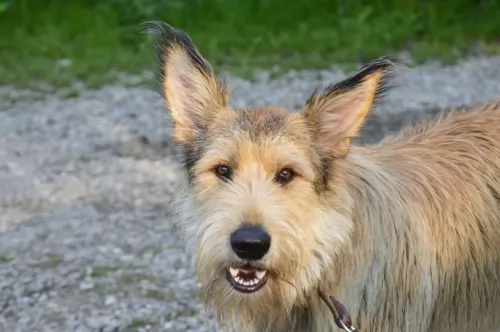 The Berger Picard needs to be a part of a pack with an owner who is clearly the pack leader. This is an intelligent, friendly, and sensitive to harsh voice scolding. They are not easy to train, and you need to be calm and patient when working with him. The Picard has a tendency to be stubborn with an owner who appears to be weak. If raised with or socialized to children and other animals, they will live fine with them. They are best in a rural environment rather than a close neighborhood. They are very quiet dogs, but they need a job and they excel at work.
The Berger Picard needs to be a part of a pack with an owner who is clearly the pack leader. This is an intelligent, friendly, and sensitive to harsh voice scolding. They are not easy to train, and you need to be calm and patient when working with him. The Picard has a tendency to be stubborn with an owner who appears to be weak. If raised with or socialized to children and other animals, they will live fine with them. They are best in a rural environment rather than a close neighborhood. They are very quiet dogs, but they need a job and they excel at work.
 The Tyrolean Hound is a keen hunting dog loving to be outdoors and active, requiring large grounds to be happy.
The Tyrolean Hound is a keen hunting dog loving to be outdoors and active, requiring large grounds to be happy.
Once he comes indoors he is able to settle down with his human family and have some quiet time with them.
He is loyal and loving, but you are going to have to be prepared for an active lifestyle with this skilled hunting dog of yours.
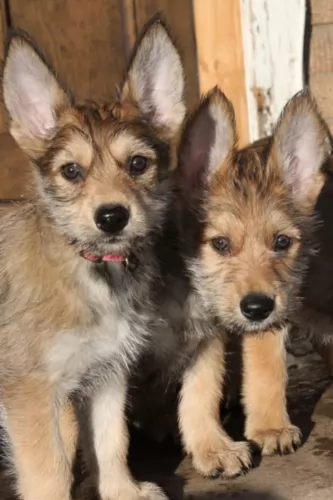 The Berger Picard is not a heavy or extra-large dog, but they still can have hip dysplasia, though it is not nearly as prevalent as it is in larger breeds. Eye infections can present in puppies more than adults and hereditary eye issues such as PRA and RD are all too common. (Progressive Retina Atrophy and Retinal Dysplasia)
The Berger Picard is not a heavy or extra-large dog, but they still can have hip dysplasia, though it is not nearly as prevalent as it is in larger breeds. Eye infections can present in puppies more than adults and hereditary eye issues such as PRA and RD are all too common. (Progressive Retina Atrophy and Retinal Dysplasia)
 Because these dogs put everything into their hunting, injuries related to hunting can sometimes plague this energetic dog.
Because these dogs put everything into their hunting, injuries related to hunting can sometimes plague this energetic dog.
Apart from that, he is robust and can live to be 12 – 14 years of age. There are one or two common dog illnesses to look out for with this dog such as hip dysplasia or ear infections.
The large, floppy ears of the Tyrolean Hound are prone to ear infections. Unlike with dogs that have erect ears, these dogs don’t have their inner ears aired and the dampness, wax and dirt cause bacteria to build up which ultimately leads to an ear infection.
The hip joint forms abnormally, leading to chronic wear and tear together with inflammation. Sometimes the dog will squeal when he gets touched around his hips. The condition can worsen and sometimes the dog even becomes lame. He will need to get to the vet for something to control pain.
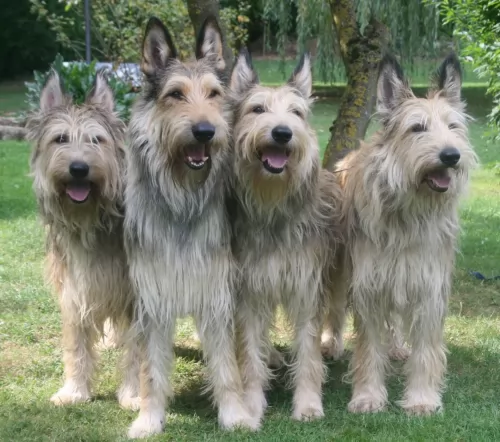 This is an athletic and active breed with a lot of energy. They need a high-quality food that is full of nutrients and not empty calories. Don’t overfeed him as some will have a tendency to become obese. They should be fed twice a day in equal proportions. Treats are good when training but don’t overdo it.
This is an athletic and active breed with a lot of energy. They need a high-quality food that is full of nutrients and not empty calories. Don’t overfeed him as some will have a tendency to become obese. They should be fed twice a day in equal proportions. Treats are good when training but don’t overdo it.
Since the Berger Picard has not been overbred, there are not a lot of genetic disorders in the breed. They do have some
You should have your puppy certified by the Orthopedic Foundation for Animals (OFA) and then the Canine Eye Research Foundation that they do not have these issues and if they do, resolve them. The results of these tests should be published in the OFA registry. This breed is also a participant in the Canine Health Information Center. This means their eyes and hips have been checked and the results published. Their blood is being stored for DNA purposes and one of the following have been evaluated: heart, elbows or thyroid. There is an OFA Berger Picard health survey whose results are available to anyone who asks. This does not track individual dogs but the breed as a whole.
This is a breed that needs a lot of exercise. She likes to swim, take long walks, take runs with you on your bike. They love to jog with you as well. Agility, obedience and any other type of competition will appeal to your Picard. However, don’t expect them to excel at competition because they are not consistent performers. But if they don’t get enough exercise and fun they will become very destructive. Barn hunt and non-competitive herding activities are perfect for the Picard.
 He has a short coat and will simply require a brush twice a week. Because of the fairly large, floppy ears, he will need to have the inside of his ears checked for redness and the possibility of an ear infection.
He has a short coat and will simply require a brush twice a week. Because of the fairly large, floppy ears, he will need to have the inside of his ears checked for redness and the possibility of an ear infection.
This dog has always been used to plenty of exercise. He won’t adapt to life in the city on a tiny property. The ideal place for this dog is on a large property, preferably a farm.
Walks, hikes, swimming, ball games, hide and seek – he is a dog that can’t seem to get enough action – he wants to be in on all the action. He is intelligent and will also need mental stimulation.
If you were to buy your lean Tyrolean Hound some commercially manufactured food, you’d buy him food that was made for high energy dogs. You’d certainly want to make sure the food is of a high quality, packed with vitamins and minerals and natural ingredients.
He would also love some home-made food too. Raw meat occasionally would do him the world of good. This sort of food needs to be plain and simple such as boiled chicken, brown rice and vegetables.